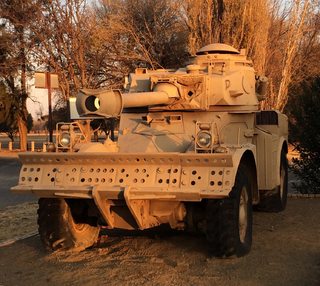 W
WThe Diary of Maria Tholo was a series of interviews with a South African resident of Soweto, Maria Tholo, which were published by Ravan Press as Tholo's 'diary' in 1979.
 W
WOperation Savannah, known in Angola as the 1975-1976 South African Invasion and Luanda Conquest Campaign, it was a military intervention carried out by the South African Defence Force's in 1975-1976 in the context of the South African Border War, the Angolan War of Independence and the subsequent Angolan Civil War.
 W
WThe South African Defence Force deployed a number of Combat Groups comprising South African and Angolan elements during Operation Savannah (Angola). Initially, only Combat Groups A and B were deployed, with the remaining groups being mobilised and deployed into Angola later in the campaign. There has been much dispute the overall size of Task Force Zulu. Current evidence indicates that the Task Force started with approximately 500 men and grew to a total of 2,900 with the formation of Battle Groups Foxbat, Orange and X-Ray.
 W
WThe South African Railways Class 35-400 of 1976 is a diesel-electric locomotive.
 W
WThe South African Railways Class 35-600 of 1976 is a branch line diesel-electric locomotive.
 W
WThe Soweto uprising was a series of demonstrations and protests led by black school children in South Africa that began on the morning of 16 June 1976.
 W
WUnited Nations Security Council Resolution 392, adopted on June 19, 1976, after the killing of black youths by South African police in Soweto and other areas, the Council strongly condemned the South African government for its measures of repression against the African people. It also expressed its shock after the "callous shooting" of the protesters and sympathy with the victims, who were demonstrating against the policies of the National Party. The resolution also reaffirmed that "the policy of apartheid is a crime against the conscience and dignity of mankind and seriously disturbs international peace and security" which continued in defiance of Security Council and General Assembly resolutions.
 W
WUnited Nations Security Council Resolution 393, adopted on July 30, 1976, after a letter from a representative from Zambia, the Council condemned a recent attack by South Africa in Zambian territory, resulting in the destruction of property and loss of life. The resolution went on to express concern at South Africa's occupation and use of South West Africa as a base for attacking neighbouring African countries, and that the continuation of this would constitute a threat to international peace and security.
 W
WUnited Nations Security Council Resolution 402, adopted on December 22, 1976, after hearing from the Minister of Foreign Affairs for Lesotho, the Council expressed concern at South Africa's decision to close the border with Lesotho in many areas in an attempt to pressure the country to recognise the "independence" of the bantustan Transkei. After recalling previous resolutions, the Council praised Lesotho for not recognising Transkei and stated it will organise economic assistance to the country from the organisation itself and other countries to help it overcome the blockade by South Africa.